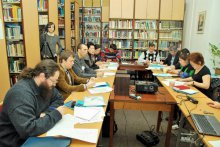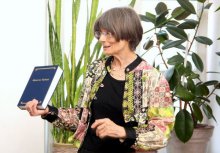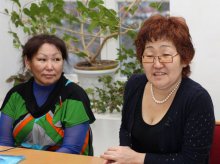


From 12 to 16 February 2013 IBT held in its office a workshop for 14 participants from 10 translation projects (Abkhaz, Avar, Chukchi, Digor, Kalmyk, Kumyk, Lak, Lezgi, Nanai and Nogai). Among them were future Bible translators, philological editors, exegetical advisers and comprehension testers. All the participants were professionals and experts in their own fields of knowledge. But in the near future they will have to face a new challenge - to master the art of Bible translation. This is why IBT has designed this training course. Experienced teachers from IBT, Heritage College, and the St. Cyril and Methodius Post-graduate School gave lectures covering a wide range of topics.
Participants learned about the history of Bible translation, the languages in which the Old and New Testament books were written, and the historical and cultural context of the Bible. Introductions to the most important books of the Bible revealed their characteristics, structure and genre, as well as the translation difficulties that may be encountered in practice. Lectures were given on exegesis, translation theory, linguistics, and the procedures of translation, philological editing and the testing of draft translations of biblical texts. The course was designed so that the lectures were followed by practical work on translation, in which the participants had an opportunity to exchange views in face-to-face discussion.
Workshop participants emphasized the interaction between theory and practice, the high professional level of the lecturers, the accessibility and coherence of the presentations, the good organization, the meaningful and systematic hand-outs, as well as the warm and friendly atmosphere and mutual understanding between participants and organizers.
Reviews of participants:
Nanai translator: "The workshop exceeded all my expectations. I thought we would get acquainted with the stages of translation and professional organizational issues. But here there was a much broader examination of the subject of Bible translation and all that surrounds it, and, most importantly, why we do it. "
Kumyk tester: "Before this workshop I had no idea about testing and all the difficult stages of the translation process. I hope my participation in this workshop will benefit my work in organizing the testing of the Kumyk Psalms. "
Digor philological editor: "The lectures on the basics of the theory of Bible translation have drawn my attention to the fact that even a well-formed sentence may not always accurately reflect the original meaning of the text, not to mention historical or culturalnuances."
Chukchi translator: "As a future translator I profited much from the video presentation of biblical realities and specific cultural aspects of the life of the people who lived in the past in a different part of the world" (about watching a movie on the historical and cultural context of the Bible).
"I'm so glad that the friendship of peoples is alive and is strengthened by such a project as Bible translation!"

Share: